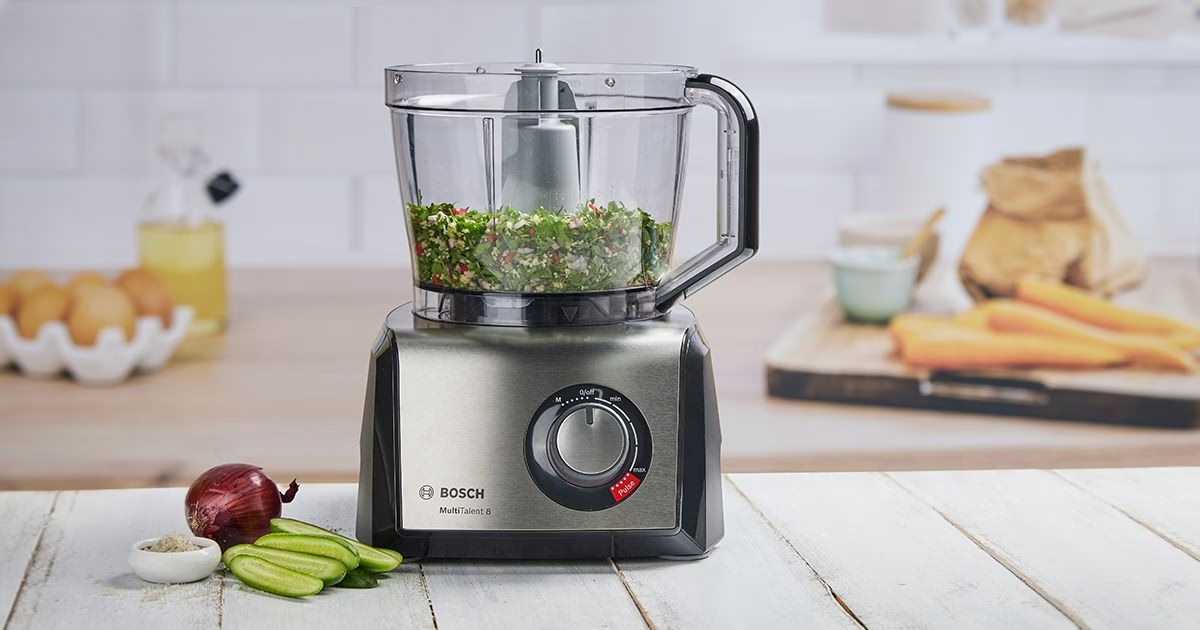In the heart of many Kenyan homes, kitchens are bustling hubs of activity, preparing everything from large quantities of finely chopped kachumbari to perfectly kneaded chapati dough, or even ground meat for kebabs. For these demanding culinary tasks, a standard food processor simply won’t cut it. What you need is a heavy-duty food processor, an appliance built to withstand rigorous daily use, process tough ingredients, and consistently deliver professional-grade results.
At Retail Place, we understand that a truly robust food processor is an investment in efficiency and culinary excellence. This comprehensive guide will define what makes a food processor “heavy-duty,” highlight its benefits for Kenyan cooking, outline the essential features to look for, and direct you to where you can find these powerhouses in Nairobi.
What Defines a Heavy-Duty Food Processor?
A heavy-duty food processor goes beyond the basic chopping and slicing of everyday models. It’s engineered for sustained performance and resilience:
- Powerful Motor: This is the core. Heavy-duty models typically feature motors of 800 watts (W) to 1200W and above for home use, with commercial models extending into the horsepower (HP) range (e.g., 1.5 HP to 5 HP). This power allows them to effortlessly process dense ingredients, knead stiff doughs, and run for longer periods without overheating.
- Durable Construction: Built with higher-quality materials, including sturdy base housings (often metal or heavy-duty plastic), robust connections, and high-grade stainless steel blades and discs that maintain their sharpness.
- Large Capacity Bowls: Work bowls typically range from 10 cups (2.4 Liters) up to 16 cups (3.8 Liters) or more. This allows for processing larger batches of ingredients, reducing the need for multiple runs.
- Versatile Attachments: While standard processors have basic blades, heavy-duty models often come with a comprehensive suite of accessories: multiple slicing and shredding discs (fine, medium, thick), a dough blade, an emulsifying disc, and sometimes even specialized dicing kits.
- Enhanced Stability: A heavier base and non-slip feet prevent the machine from “walking” or vibrating excessively, even during intensive tasks.
Why Invest in a Heavy-Duty Food Processor for Your Kenyan Kitchen?
For serious home cooks and those with demanding culinary needs in Kenya, a heavy-duty food processor offers undeniable advantages:
- Effortless Ingredient Preparation: From finely chopping large quantities of onions and tomatoes for sukuma wiki or stews, to grating carrots and cabbages for salads, these machines make tedious prep work lightning fast.
- Mastering Doughs: A powerful motor and specialized dough blade can knead chapati dough to perfection in minutes, saving significant manual effort.
- Grinding Power: Ideal for grinding meats for homemade sausages or meatballs, processing nuts for spreads, or even making spice pastes for biryani or pilau.
- Batch Cooking & Meal Prep: For families who cook in large quantities or do weekly meal prep, the large capacity means you can process ingredients in bulk, saving time throughout the week.
- Durability & Longevity: Built to last, a heavy-duty food processor can withstand the rigors of frequent use, proving to be a wise long-term investment.
- Versatility for Diverse Cuisines: Beyond Kenyan staples, it can handle ingredients for international dishes, from pureeing sauces to making hummus.
Essential Features to Look for in a Heavy-Duty Food Processor
When you’re ready to purchase, consider these key attributes:
Motor Power (Wattage/HP)
- For Home Use: Aim for a minimum of 800W, with 1000W to 1200W being ideal for robust performance. Some popular “commercial-style” blenders/processors found in Kenya might claim much higher wattages (e.g., 2000W-5000W); while these can be very powerful for their price, verify actual performance through reviews.
- For Semi-Commercial/Very Frequent Use: Consider models approaching 1.5 HP if you’re doing truly large-scale processing.
Work Bowl Capacity
- 10-Cup (2.4L) to 14-Cup (3.3L): Excellent for most large families and batch cooking.
- 16-Cup (3.8L) or more: Suitable for very large households or entertaining frequently.
- Material: Look for sturdy, BPA-free plastic (e.g., Tritan) or shatter-resistant glass.
Blade & Disc Quality
- Stainless Steel Blades: Essential. Look for sharp, durable S-blades for chopping and pureeing.
- Variety of Discs: A good set includes:
- Reversible Slicing/Shredding Disc: For various thicknesses.
- Grating Disc: For cheese, carrots, etc.
- Dough Blade: A plastic blade specifically designed for kneading bread and chapati dough.
- Emulsifying Disc/Whisk: For whipping creams or making mayonnaise.
Feed Tube Size
- Wide Feed Tube: Allows you to insert larger fruits and vegetables without pre-cutting, saving time. Look for models with a 3-in-1 or extra-wide chute.
Controls & Speed Settings
- Pulse Function: Crucial for precise control over consistency (e.g., for kacuhmari or coarse chops).
- Multiple Speeds (Low/High): Allows you to vary intensity for different ingredients.
- Intuitive Controls: Easy to understand and operate.
Durability & Stability
- Heavy Base: Prevents movement and reduces vibration.
- Sealed Bowl: Prevents leaks when processing liquids.
- Safety Interlocks: Ensure the machine won’t operate unless all parts are correctly assembled.
Ease of Cleaning
- Dishwasher-Safe Parts: Most bowls, lids, and blades are now dishwasher safe, making cleanup much easier.
- Smooth Surfaces: Less crevices for food to get trapped in.
Where to Find Heavy-Duty Food Processors in Nairobi
Nairobi’s appliance market offers a good range of heavy-duty food processors, from established international brands to robust local options.
Major Appliance Retailers
- Hotpoint Appliances: Carries leading international brands like Bosch, Kenwood, Philips, and Braun, which offer excellent heavy-duty models with various features and capacities.
- Ramtons, Mika, Von: These popular local brands often have powerful “food factory” or multi-function food processors with higher wattages and larger capacities suitable for heavy-duty home use.
Online Marketplaces
- Jumia Kenya: Offers the widest selection, allowing you to compare models, read customer reviews, and filter by wattage and capacity. Search for “heavy duty food processor,” “commercial food processor,” or look for models with 1000W+ power.
- Electronics Place, Microless, Shopit: Other reputable online platforms that stock a variety of food processors, including more powerful models.
- Ubuy Kenya: Can sometimes list more specialized commercial-grade food processors for those with very high demands.
Supermarkets & Electronics Stores
- Carrefour, Naivas, Quickmart: While they may carry general kitchen appliances, check their larger branches for mid-range to higher-end food processors from brands like Philips, Kenwood, and some local options.
Pricing in Nairobi (Estimates)
Prices for heavy-duty food processors can vary significantly based on brand, motor power, capacity, and included attachments.
- Good Quality Home Heavy-Duty (800W-1200W, 10-14 cup): KSh 18,000 – KSh 45,000+
- “Commercial-Style” / Ultra-High Wattage Home (1500W+ nominal, 2L+ bowls): KSh 12,000 – KSh 35,000 (These are often found from brands like Signature, Ailyons, Nunix, and can offer great value, but research specific models/reviews.)
(Note: Prices are approximate and can fluctuate based on promotions, retailer, and specific features. Always verify specifications and read reviews.)
A heavy-duty food processor is a game-changer for any serious cook in Kenya. It transforms laborious prep tasks into quick, effortless steps, giving you more time to enjoy the art of cooking and the delicious results. By prioritizing power, capacity, and durable construction, you’ll find an indispensable kitchen workhorse that serves your family’s culinary needs for years to come.









